Basically, face recognition applications capture and analyze unique facial features to create a kind of digital “faceprint” that enables technology to identify individuals. This technique has now emerged as one of the most important tools in security, health care, and various personal applications in everyday life.
Ready to know how facial recognition is changing our future and what apps are leading the charge? If you’re excited to learn about the top facial recognition apps making waves, read on!
What Is Facial Recognition Technology and How Does It Work?
Facial recognition app uses technology and biometrics — typically through AI — to identify human faces. It is actually about capturing the face of a person in an image or video and then mapping his or her unique facial features. It would then match those facial features against known faces in a database.
For example, when a picture is fed into a facial recognition system, it picks out some key features on the face, such as the distance between the eyes, the shape of the nose, or the curve of the jaw. These measurements get translated into a mathematical representation, known as a “faceprint,” which is then compared with faceprints stored in the system’s database to find a match.
Facial recognition technology makes work easier and more secure for humans. Most of us use it every day to quickly and securely unlock our phones and access them without the trouble of remembering and inserting passwords. The technology is also used in getting access to secure buildings, which only allows specific personnel to get in. Verification services for one’s identity, like banking apps, and other services use facial recognition for quick access, to avoid keeping multiple passwords and add security.
Planning to Adopt Facial Recognition Technology For Your Business?
We've Helped Businesses Cross The Chasm With Our Data-Driven Approach Toward App Development, And We've Brought
Hire Expert18 Best Facial Recognition Applications for Android and iOS
The table below, is a brief overview of each face recognition app, focusing on the key recognition features, security measures and privacy, costs, update frequency, and data handling practices.
| App |
Platform |
Recognition Features |
Security & Privacy |
Cost |
Update Frequency |
Data Handling Practices |
| Microsoft Face API |
Android, iOS |
Face detection, verification, emotion recognition |
High accuracy, reliable security |
Paid |
Regular updates |
Data stored securely, used for API services |
| Luxand |
Android, iOS |
Real-time recognition, custom profiles |
Smart lock integration, face detection in photos |
Free with premium features |
Frequent updates |
Encrypted storage, strict privacy policies |
| Google Photos |
Android, iOS |
Face detection and grouping, tagging |
Cloud storage, integrated with Google services |
Free |
Regular updates |
Data used for service improvement, encrypted storage |
| Blippar |
Android, iOS |
AR content unlocking, dynamic filters |
Data privacy ensured through encryption |
Free with in-app purchases |
Regular updates |
Data encrypted, used for AR functionalities |
| FaceApp |
Android, iOS |
Age, gender swap, makeup, hairstyle changes |
Live detection, cloud storage for facial data |
Free with in-app purchases |
Regular updates |
Data used for ads, stored securely |
| Railer |
Android, iOS |
AI face recognition for safety alerts |
Secure data handling, alerts for unfamiliar faces |
Free |
Regular updates |
Encrypted data, secure storage |
| AppLock |
Android |
Face and voice recognition, app locking |
Intruder photo capture, customizable lock settings |
Free |
Regular updates |
Data stored locally, not shared |
| Face2Gene |
Android, iOS |
Genetic disorder detection, phenotype analysis |
Patient data security, compliance with medical standards |
Free |
Regular updates |
Encrypted patient data, secure handling |
| BioID |
iOS |
Face and voice biometric authentication |
Advanced liveness detection, secure login |
Free |
Regular updates |
Data encrypted, secure biometric data |
| FaceFirst |
Android, iOS |
Real-time identification and verification |
Advanced encryption, data privacy protocols |
Free with premium features |
Frequent updates |
Data encrypted, high-security protocols |
| MojiPop |
Android, iOS |
Personalized emoji creation |
Data security for saved emojis |
Free with in-app purchases |
Regular updates |
Data encrypted, used for personalized content |
| Face++ |
Android, iOS |
Face detection, analysis, identification |
Comprehensive security features |
Paid |
Regular updates |
Data encrypted, used for third-party integrations |
| True Key |
Android, iOS |
Facial recognition for password management |
AES-256 encryption, multi-factor authentication |
Free with in-app purchases |
Regular updates |
Data encrypted, secure password management |
| Digipass |
Android, iOS |
Secure login using facial recognition |
Encrypted vault for personal data |
Paid |
Regular updates |
Data encrypted, secure login processes |
| Face DNA Test |
Android |
Personality analysis, health risk assessment |
Secure biometric analysis |
Free |
Occasional updates |
Data encrypted, not shared |
| LogMeIn |
Android, iOS |
Secure facial recognition login |
Customizable security settings, data encryption |
Free |
Regular updates |
Data encrypted, secure handling |
| FaceLock |
Android |
App and settings locking with facial recognition |
Intruder photo capture, customizable security settings |
Free |
Regular updates |
Data stored locally, secure handling |
| Kairos Time Clock |
Android, iOS |
Facial recognition for workforce management |
Accurate and efficient tracking |
Paid |
Regular updates |
Data encrypted, secure workforce data |
Next, we will provide a thorough examination of each app, covering all its key features.
1. Microsoft Face API (Android, iOS)
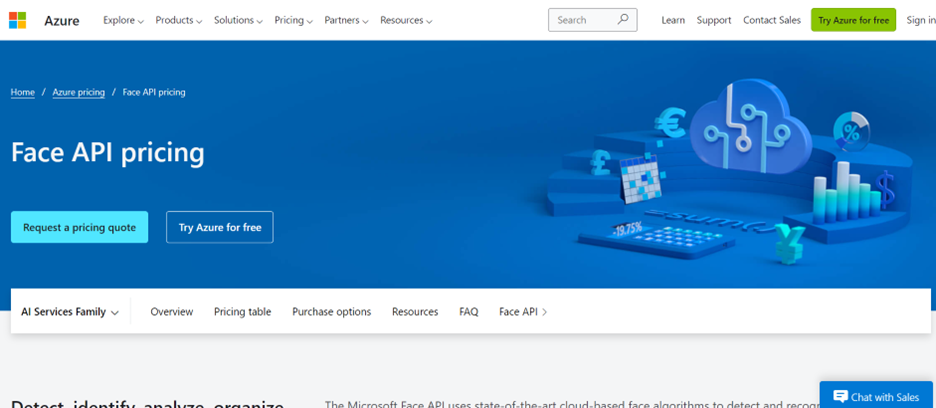
The Microsoft Face API is simply a facial recognition software that can be integrated into anyone’s application. It enables the detection of faces, face verification, and also recognizes emotions. The huge use of the API can be found in innumerable third-party apps and services implementing face recognition functionalities.
Features:
- Face detection and verification
- Emotion recognition and analysis
- Integration with third-party apps
- High accuracy and reliability
- Support for various platforms
2. Luxand (iOS, Android)
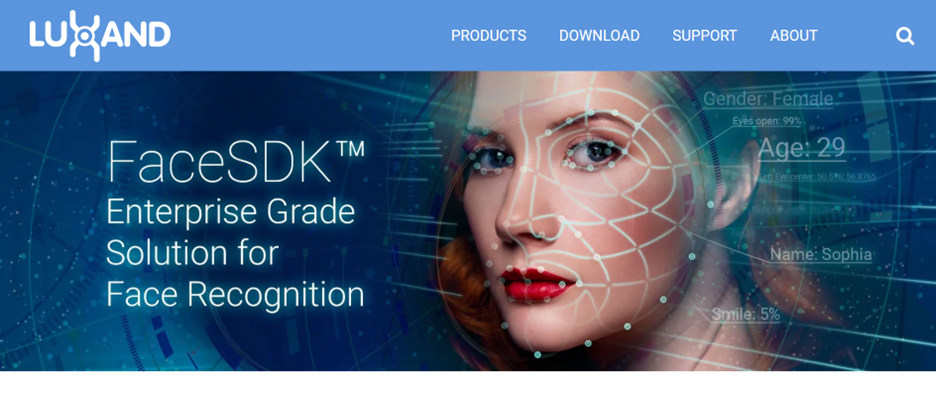
Luxand is a definitive facial recognition app designed for both personal and professional use. It delivers real-time face recognition and allows support for a wide spectrum of applications, from security to entertainment. The application can detect and recognize faces from photos and videos, which is very useful in many ways.
Features:
- Quick and accurate identification of faces in real-time.
- Create profiles for different faces, including pets and family members.
- Integrate with smart locks for enhanced security.
- Easily organize and search photos based on detected faces.
- Uses sophisticated AI for accurate and fast recognition.
3. Google Photos (Android, iOS)
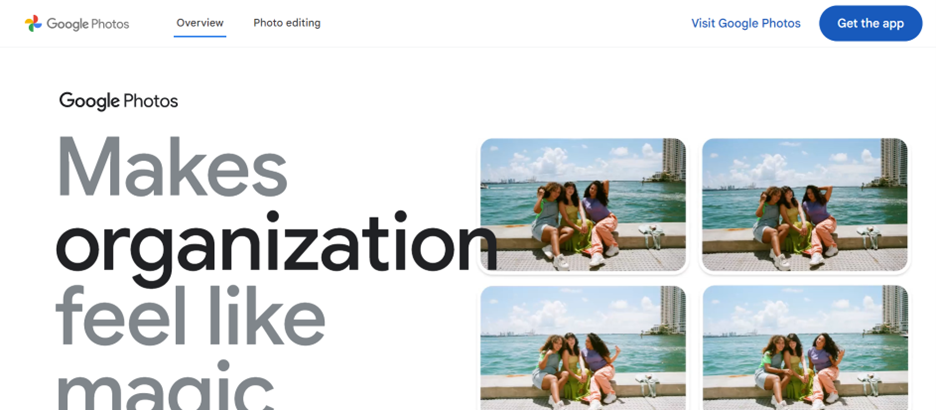
Google Photos is a face identification app that applies face recognition to your photo library. The app recognizes faces from the uploaded photos, analyzes them, and then organizes faces that look alike.
Features:
- Automatic face detection and grouping
- Easy tagging and naming of recognized faces
- Search photos by individual faces
- Cloud storage for photo backup
- Integration with Google services
4. Blippar (iOS, Android)

Blippar is a sophisticated facial recognition app that uses augmented reality to create a range of interactive and engaging experiences. You can scan your face to unlock a range of AR functions. The users find it a pleasurable learning tool.
Features:
- Unlocks AR content by scanning faces.
- Apply fun and dynamic filters that respond to facial expressions.
- Provides informative AR experiences based on facial features.
- Share AR creations directly on social media platforms.
- Uses sophisticated technology to accurately map and recognize faces.
5. FaceApp (iOS, Android)
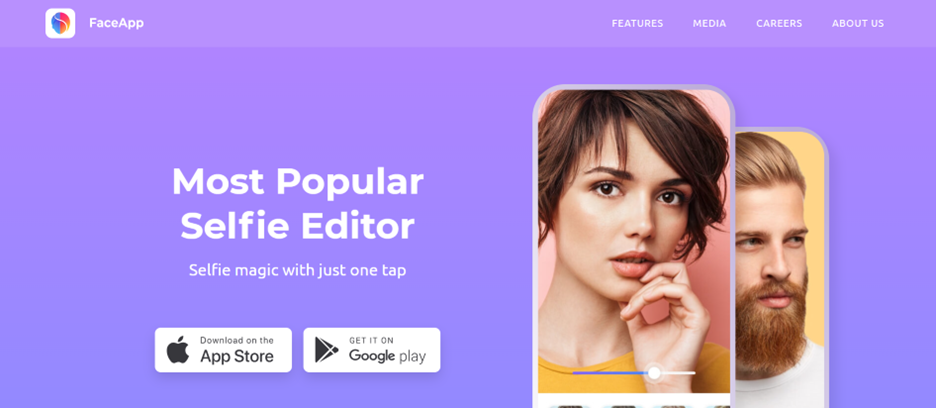
FaceApp is a popular face recognition app that allows users to change their looks in a number of different ways, like face aging, change of gender, makeup, and trying different hairstyles.
Features:
- Switch between different ages and genders with realistic results.
- Apply makeup or try out different hairstyles virtually.
- Prevents fraudulent usage by detecting live faces.
- Store facial data on the cloud for easy access across multiple devices.
- Adjust lighting and backgrounds to improve recognition accuracy.
6. Railer (iOS, Android)
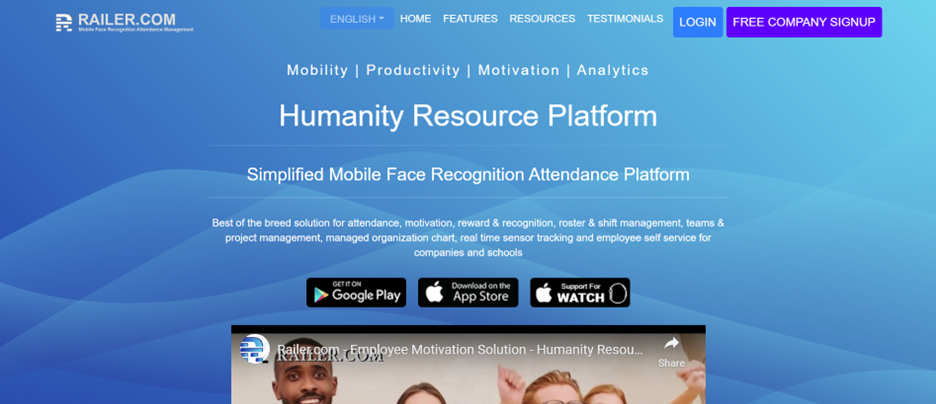
Railer is a free facial recognition app and it is designed to enhance personal safety. It uses AI technology to recognize and memorize familiar faces, making it easier to identify strangers or suspicious individuals around you.
Features:
- Uses artificial intelligence to recognize and memorize faces.
- Alerts you if an unfamiliar face is detected.
- Helps identify potential threats around you.
- Easy to use; navigate easily through the system.
- Available at no cost, providing valuable safety features for everyone.
7. AppLock (Android)

AppLock is a free face recognition app for Android, developed to ensure the safekeeping of your private apps and data. Working with either your face or your voice, AppLock will allow only you to get into your private information, thus heavily securing your device.
Features
- Utilizes your device’s front camera for facial recognition.
- Option to use voice recognition for added security.
- Lock specific apps or folders with facial recognition.
- Set time delays for automatic re-locking.
- Easy to use with a straightforward setup process.
8. Face2Gene (iOS, Android)

Face2Gene is an app developed for medical professionals. It makes use of facial recognition in support of the diagnosis of a genetic disorder by facial features. This mobile app is one of the most essential tools in healthcare in the identification of rare diseases.
Features:
- Analyzes facial features to diagnose genetic conditions.
- Allows healthcare professionals to share and discuss cases.
- Ensures patient information is protected and confidential.
- Access to a vast library of genetic disorders and their facial characteristics.
- Detailed analysis of facial and non-facial features for accurate diagnosis.
9. BioID – ( iOS)
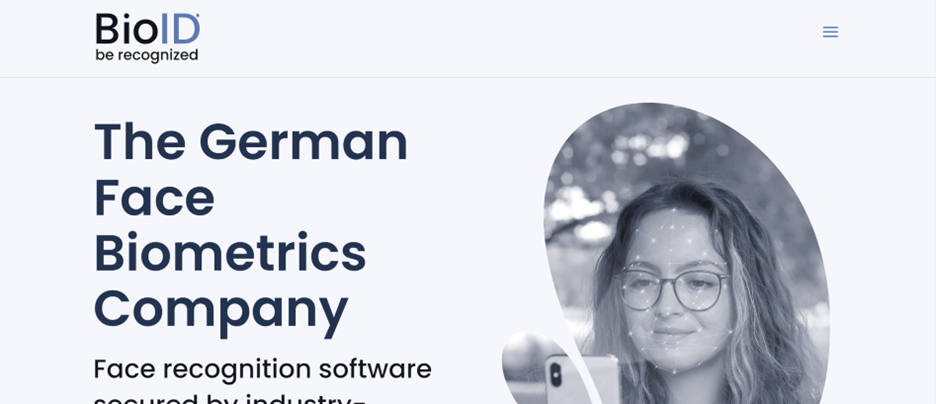
BioID provides secure access to applications and services by authenticating using face and voice-based authentication. This app enhances security without having to use traditional passwords, making it smooth at the authentication experience.
Features:
- Secure biometric authentication
- Advanced liveness detection
- Prevents unauthorized access
- Easy integration with supported services
- User-friendly experience
10. FaceFirst (iOS, Android)
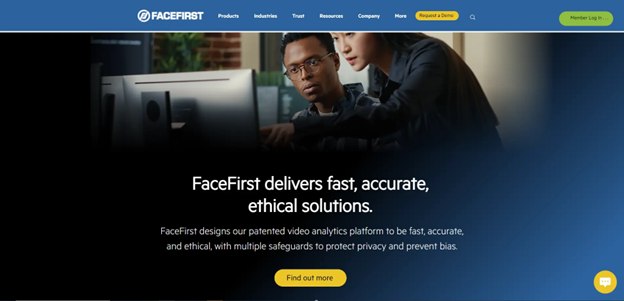
FaceFirst is a very influential facial recognition app that is used by almost all businesses and organizations mainly for security purposes. This app provides real-time identification and verification facilities, so it would be suitable for developing security measures.
Features:
- Quick and accurate face recognition for security applications.
- Integrate with any existing security systems to enhance functionality.
- Offers solutions tailor-made for a variety of industries, including retail or transportation.
- Easy to use and navigate.
- Utilizes advanced algorithms for precise identification.
11. MojiPop (iOS, Android)

MojiPop is a creative application that can turn your selfie into personalized stickers and emojis. It uses AI to map the facial features and create fun, expressive emojis out of those—like you.
Features:
- Create stickers and emojis using your selfies.
- Mix and match different expressions, outfits, and accessories to make your emoji unique.
- Instantly see changes as you edit your emojis.
- Share your creations on social media or messaging apps.
- Accurate mapping of facial features to create lifelike emojis.
12. Face++ (Android, iOS)
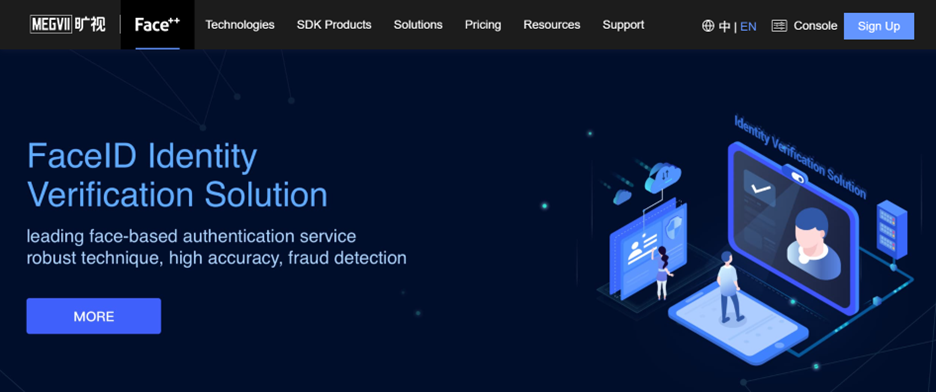
Face++ by Megvii is a facial recognition service. The tool is used by developers to integrate the functions of facial recognition into third-party apps. It provides robust features of face detection, analysis, and identification; therefore, it will be suitable for security systems and authentication processes.
Features:
- Face detection and analysis
- High accuracy identification
- Integration with third-party apps
- Comprehensive security features
- Supports multiple platforms
13. True Key (iOS, Android)
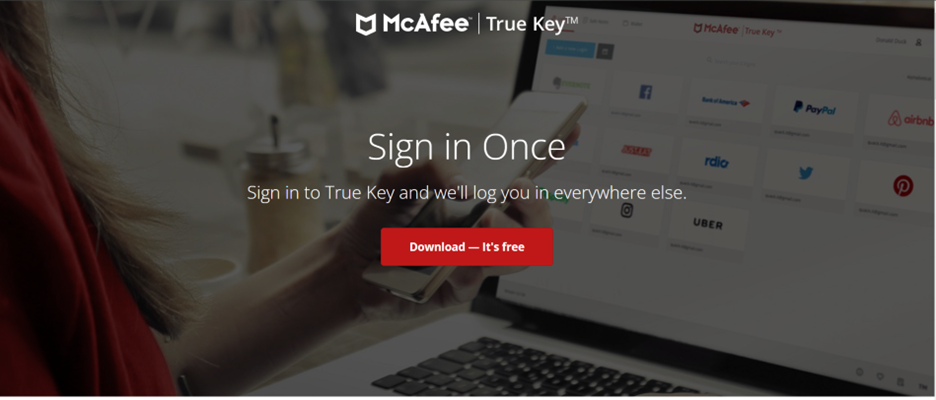
True Key by Intel Security is an all-rounder app that allows you to log in to websites and apps by using a face recognition system. Security and ease are therefore guaranteed as your unique facial features become your password.
Features:
- All of your data will be kept securely encrypted.
- Allows access to work seamlessly on a smartphone, tablet, or desktop.
- Logs you into your favorite sites and apps instantly.
- Safely stores and manages your passwords.
14. Digipass (iOS, Android)
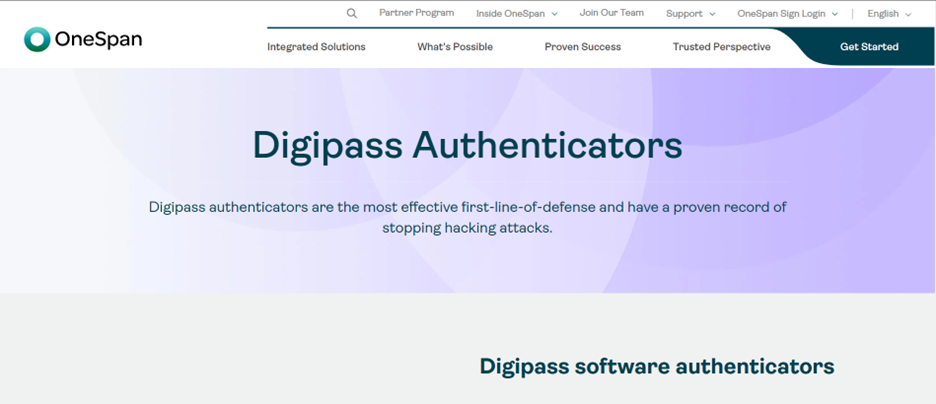
Digipass is a face recognition application that authenticates users through facial identification to ensure a secure login to any account. It does not require a traditional password as it relies on biometric data.
Features:
- Uses facial recognition for secure login.
- Stores personal information and passwords securely.
- Easily log into multiple services.
- Adjust security levels based on user preferences.
- User-Friendly Interface.
15. Face DNA Test (Android)
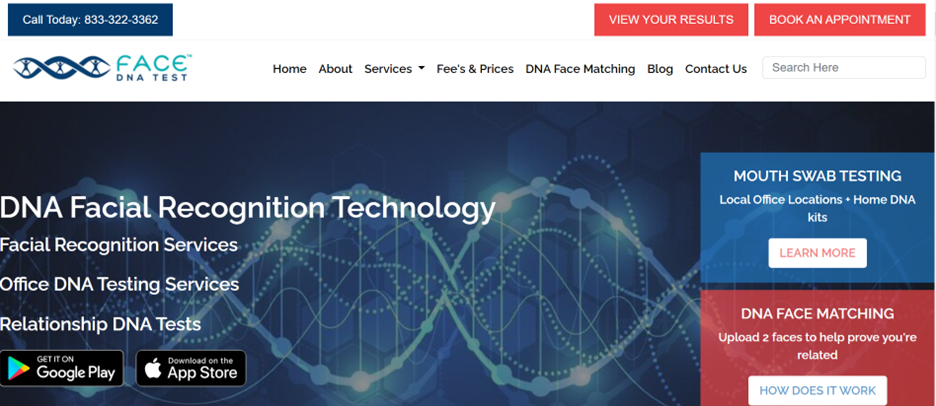
Face DNA Test is an exciting app that uses facial recognition to analyze your face and then give you information regarding your personality, health, and ancestry. The program does not simply recognize faces but offers an analysis of the finer details of your face.
Features:
- Examines wrinkles, blemishes, and skin texture.
- Provides insights into traits like intelligence and emotional stability.
- Evaluates potential health risks based on facial characteristics.
- Offers a percentage estimate of your ancestry from different regions.
- Utilizes sophisticated biometric techniques for accurate analysis.
16. LogMeIn (iOS, Android)

LogMeIn offers a simple and secure way to log into accounts using facial recognition. It captures and verifies your face to ensure only you can access your personal information.
Features:
- Integration with Social Media: Easily log into your social media accounts.
- Customizable Security
- Simple setup and easy navigation.
- High accuracy in face recognition.
- Provides secure login features at no cost.
17. FaceLock (Android)
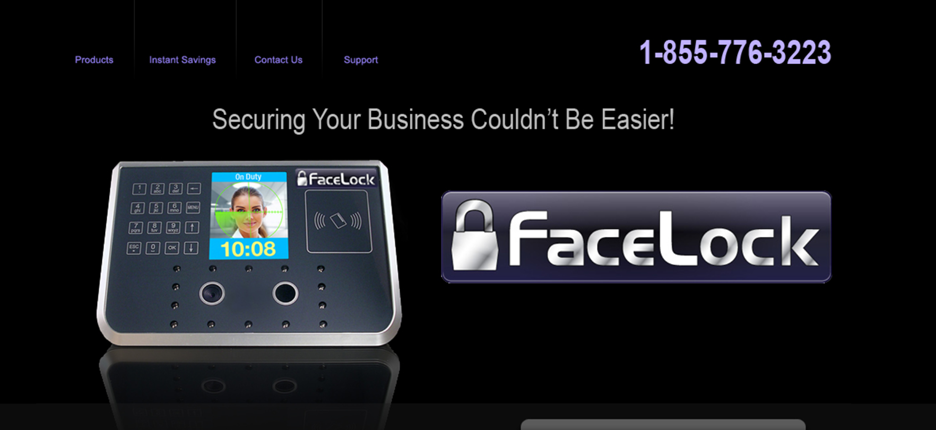
FaceLock secures your apps by scanning your face, ensuring only authorized users can access them. If an intruder fails to unlock the app after a few attempts, FaceLock captures a photo of the intruder. It can also lock device settings to prevent unauthorized changes.
Features:
- App and settings locking with facial recognition
- Intruder photo capture
- Customizable security settings
- Easy to use
- Reliable face detection
18. Kairos Time Clock (Android, iOS)
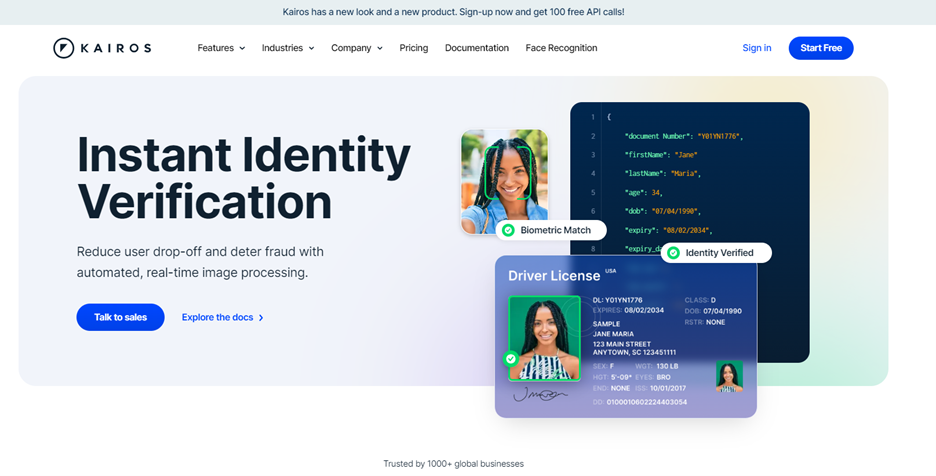
Kairos Time Clock is designed for workforce management, allowing employees to clock in and out using facial recognition. This app eliminates the need for physical time cards and integrates with time-tracking and attendance systems, making it ideal for businesses.
Features:
- Facial recognition for clocking in and out
- Integration with time-tracking systems
- Reduces reliance on physical time cards
- Enhances workforce management
- Accurate and efficient tracking
Now let’s discuss the applications and real-life use cases of the apps we have discussed above!
What Are The Applications And Use Cases of Facial Recognition Apps
Face recognition apps are used almost in every sector across the world. Discussed below are some of the general applications and cases:
Criminal Identification
- Identifies suspects by comparing facial images with databases.
- Helps law enforcement track and apprehend criminals.
- Enhances public safety by monitoring high-risk areas.
Digital Onboarding
- Verifies new clients’ identities for online services.
- Speeds up the registration process for financial institutions.
- Reduces the risk of identity fraud during sign-ups.
Access Control
- Allows only authorized personnel to enter restricted areas.
- Enhances security in workplaces and secure facilities.
- Replaces traditional keycards with facial scans.
Security and Surveillance
- Monitors public spaces for potential threats.
- Enhances private property security by recognizing intruders.
- Provides real-time alerts for suspicious activities.
Healthcare
- Assists in patient identification and verification.
- Enhances security in accessing medical records.
- Helps in diagnosing genetic disorders by analyzing facial features.
Identity Fraud Prevention
- Verifies identities before transactions.
- Prevents unauthorized access to personal accounts.
- Reduces the incidence of financial fraud.
Event Registrations
- Speeds up attendee check-in processes.
- Ensures only registered individuals gain entry.
- Enhances the security of large events and gatherings.
Airport Operations
- Speeds up passenger boarding and check-in.
- Reduces wait times at security checkpoints.
- Enhances overall airport security.
Financial Services Verification
- Secures access to banking services.
- Authorizes financial transactions securely.
- Prevents unauthorized account access.
Smartphone Unlocking
- Provides a secure way to unlock devices.
- Replaces passwords and PINs with facial recognition.
- Enhances user convenience and device security.
Retail Analytics
- Analyzes customer behavior and preferences.
- Tracks foot traffic and engagement in stores.
- Helps retailers optimize store layouts and marketing strategies.
Thinking of integrating facial recognition technology into your business?
Go ahead with BitsWits! Our expert team will help you develop a cutting-edge custom facial recognition app for your business.
Hire ExpertWhich Technology Is Used In The Face Recognition System?
AI, especially machine learning and deep learning algorithms are the core technologies behind face recognition apps.
1. Artificial Intelligence (AI)
AI algorithms help the system learn from a large amount of data. Over time, as the system is exposed to more faces, it gets better at recognizing them.
Example: When you upload a picture, AI helps the system identify key features like eyes, nose, and mouth and learns to distinguish these features from person to person.
2. Computer Vision
Computer vision is a field of AI that enables computers to interpret and understand visual information. It involves capturing images, processing them, and extracting useful information.
Example: Computer vision allows the system to detect a face in a crowd or analyze an image from a surveillance camera to identify individuals.
3. Biometric Analysis
Biometric analysis refers to measuring and analyzing unique physical characteristics. For facial recognition, it means analyzing the distinct features of a face.
Example: The system measures the distance between eyes, the shape of cheekbones, and other facial features to create a unique faceprint for each individual.
4. Neural Networks
Convolutional neural networks (CNNs) are a type of neural network specifically designed for image recognition. They are crucial for identifying and extracting features from images.
Example: CNNs help the system accurately identify facial features by processing pixel data from images, making the recognition process more precise.
Together, these technologies enable face recognition apps to function accurately and reliably, enhancing security and user experience in various applications like unlocking smartphones, verifying identities at airports, and more.
What is The Development Process For Facial Recognition Apps
Let’s discuss the development process for face recognition apps.
Research
Begin with thorough research to understand the target audience, use cases, and existing technologies. This helps in creating a user-focused and effective app.
Data Collection and Annotation
Collect a diverse set of facial images and label them accurately. This ensures the model can recognize different faces accurately and inclusively.
Image Preprocessing
Standardize and enhance the images through preprocessing techniques. This step prepares the data for better recognition under various conditions.
Feature Extraction
Identify key facial landmarks and convert these into numerical vectors. These vectors serve as the basis for matching and identifying faces.
Machine Learning Models
Train machine learning algorithms, like deep neural networks, on the extracted features. These models learn to identify and distinguish faces with high accuracy.
Accuracy Testing and Refinement
Test the model rigorously and refine it iteratively to improve performance and reliability.
Why Should You Develop a Facial Recognition App for Your Business? What Are The Benefits?
Face identification apps offer personalization, enhanced security, contactless payments, time-saving, accessibility, and data protection. As these technologies advance, they promise even greater benefits for Android and iOS users.
Personalization
- Provides a tailored user experience.
- Grants quick access to devices, social media app, and banking apps with a facial scan.
- Eliminates the need for multiple passwords or patterns.
Enhanced Security
- Adds an extra layer of protection against hacking.
- Uses unique biometric data, making it hard for unauthorized access.
- Secures personal information and devices more effectively than traditional methods.
Contactless Payment
- Enables transactions with a simple face scan at payment terminals.
- Reduces the need for physical contact or handling devices.
- Facilitates safer and quicker payments.
Time-saving
- Automates logins and autofill functions, reducing manual input.
- Saves time by eliminating the need for entering usernames and passwords.
- Streamlines the user experience, making access quicker and easier.
Accessibility
- Provides easy device and account access for individuals with disabilities.
- Removes physical barriers to accessing technology.
- Enhances convenience for all users.
Data Protection
- Includes features like encryption and secure storage.
- Ensures biometric data is safe from unauthorized access.
- Protects user privacy and sensitive information.
Want To Integrate facial recognition to personalize customer experiences?
With BitsWits, you can easily develop the right face recognition app that improves security, enhances operations, and boosts user experience.
Hire ExpertFactors to Consider When Choosing a Face Recognition App
Here are the factors to consider before choosing a facial recognition app.
Accuracy and Performance
Ensure the app consistently delivers reliable results. Look for user reviews and performance tests that highlight the app’s accuracy in various conditions.
Security and Privacy
Choose apps that prioritize user data protection. Facial data should be encrypted and stored securely, and the app should comply with data protection regulations.
User Interface and Experience
Select an app with a user-friendly interface. Intuitive navigation and minimal complexities enhance the overall user experience.
Additional Features
Examine other features that the app includes, such as photo editing, animation, or even social media sharing, to know which suits your needs.
What Is The Future of Facial Recognition Technology?
As technology continues to advance, the future of facial recognition looks incredibly promising. We can expect significant improvements in accuracy, speed, and versatility, making this technology even more integral to our daily lives.
While face recognition apps offer enhanced security features, they also pose significant privacy risks. Users should be aware of these risks and use the apps cautiously, ensuring that they are informed about how their biometric data will be used and stored.
Final Thoughts
Face recognition apps seamlessly fit into industries like healthcare, education, retailing, and security, and are going to change how we interact with devices and go about our daily activities. The widespread adoption of facial recognition in everyday life, from smart homes to public transportation, will introduce new levels of convenience and efficiency, marking a significant evolution in our technological landscape.
If you are searching for facial recognition apps, we hope this article helps you narrow down your options. We’ve provided a comprehensive overview of top-tier face recognition apps, perfect for hands-on experimentation.
FAQs





























